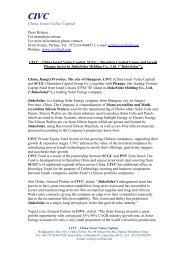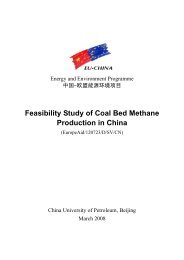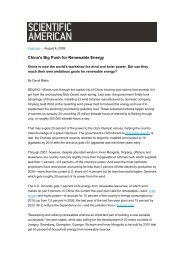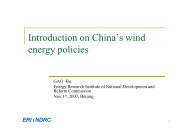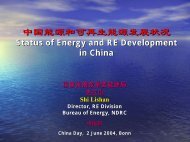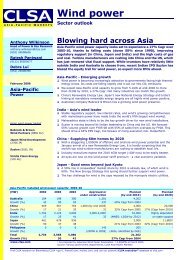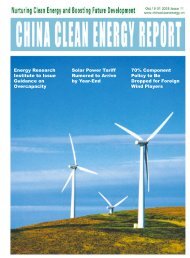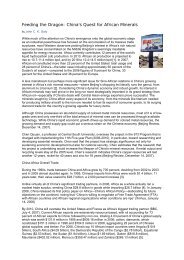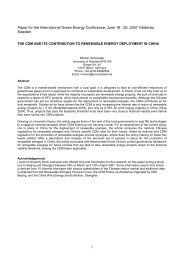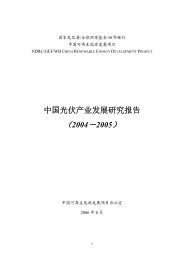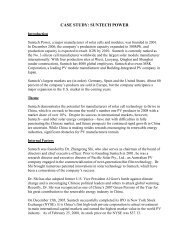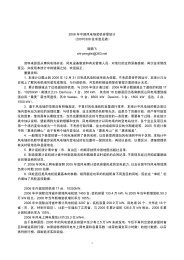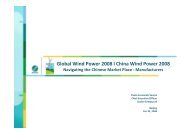LDK Solar Co., Ltd. - Asia Europe Clean Energy (Solar) Advisory Co ...
LDK Solar Co., Ltd. - Asia Europe Clean Energy (Solar) Advisory Co ...
LDK Solar Co., Ltd. - Asia Europe Clean Energy (Solar) Advisory Co ...
You also want an ePaper? Increase the reach of your titles
YUMPU automatically turns print PDFs into web optimized ePapers that Google loves.
capacity or to increase our manufacturing output, we will be unable to increase our sales and capture<br />
additional market share, and our results of operations will be adversely affected.<br />
We rely on a limited number of suppliers for our production equipment and failure or delay by any of<br />
them in delivering equipment or spare parts to us could adversely impact our production.<br />
We rely on a limited number of equipment suppliers for all of our principal manufacturing equipment and<br />
spare parts, including our DSS furnaces, squarers that we use to cut multicrystalline ingots into smaller blocks,<br />
and wafering wire saws that we use to slice these blocks into wafers. Our equipment suppliers include GT<br />
<strong>Solar</strong> Incorporated, or GT <strong>Solar</strong>, HCT Shaping Systems SA, or HCT Shaping, Meyer Burger AG, or Meyer<br />
Burger, and Sinocon Machinery <strong>Co</strong>mpany. These suppliers have supplied most of our current equipment and<br />
spare parts, and we will also rely on them to provide a substantial portion of the principal manufacturing<br />
equipment and spare parts contemplated in our expansion program. There is currently a shortage globally in<br />
much of the equipment required for our manufacturing process and capacity expansion. Our strategy includes<br />
a substantial expansion of our annual production capacity. We have entered into contracts with these<br />
equipment manufacturers to purchase additional equipment from them that is expected to be sufficient for our<br />
planned expansion up to approximately 400 MW by the end of 2007 and to approximately 600 MW by mid-<br />
2008. Although we also plan to further expand our annual production capacity to approximately 800 MW by<br />
the end of 2008, we currently do not have all the equipment supply contracts necessary to support the<br />
additional 200 MW expansion.<br />
If we fail to develop or maintain our relationships with these and other equipment suppliers, or should any<br />
of our major equipment suppliers encounter difficulties in the manufacturing or shipment of its equipment to<br />
us, including due to natural disasters or otherwise fail to supply equipment according to our requirements, it<br />
will be difficult for us to find alternative providers for such equipment on a timely basis and on commercially<br />
reasonable terms. As a result, the implementation of our expansion plan may be interrupted and our<br />
production may be adversely impacted.<br />
We may develop excess production capacity and, as a result, our profitability may be adversely affected.<br />
Our expansion plan is based on the projected market demand for solar wafers relative to the current<br />
insufficient production capacity in the wafer manufacturing segment of the solar industry. There has been an<br />
industry-wide expansion effort to increase the overall wafer production capacity. In connection with our<br />
expansion plan, we have entered into substantial commitments to purchase polysilicon feedstock over the next<br />
few years. As of March 31, 2007, these commitments amounted to approximately $896.7 million in the<br />
aggregate, with the purchase price subject to periodical renegotiations. Any aggressive expansion of<br />
manufacturing capacity by us and our competitors may result in significant excess capacity in the wafer<br />
segment or in the overall solar industry and, as a result, prices may decline, our utilization ratio may decrease<br />
and our results of operations may be adversely affected.<br />
Prices for our wafers are expected to decline in the next few years, which could adversely affect our gross<br />
margin.<br />
Our wafer prices are based on a variety of factors, including global market wafer prices, supply and<br />
demand conditions in China, which currently is our largest market, and the terms of our customer contracts,<br />
including sales volumes and the terms on which certain customers supply us with polysilicon feedstock.<br />
According to Photon <strong>Co</strong>nsulting, wafer prices on a per-watt basis are expected to decline in the next few years<br />
due to increased production efficiencies, expected increases in global polysilicon supplies, declines in<br />
polysilicon prices, and increased wafer production capacity in our industry. If wafer prices decline and we are<br />
unable to lower our costs in line with the price decline, whether through manufacturing larger ingots or thinner<br />
wafers, or through technological advances, our gross margins would be adversely affected. In addition, as a<br />
part of our geographic expansion strategy and to strengthen our long-term customer base, we plan to<br />
significantly expand our overseas sales in 2007 and future years to target the top 20 solar cell and module<br />
manufacturers in the world. The current prevailing international market price for solar wafers is lower than the<br />
prevailing PRC market price. As a result, our increase in overseas sales may reduce our gross margin in the<br />
near term.<br />
14



